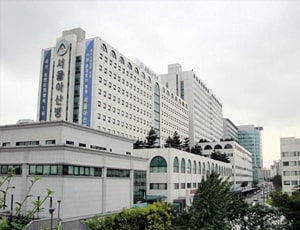The average cost of Hip Resurfacing Surgery in Seoul approximately starts from USD 25000
Treatment cost

Asan Medical Centre located in Seoul, South Korea is accredited by ISO. Also listed below are some of the most prominent infrastructural details:

Birmingham hip resurfacing surgery is an alternative to the total hip replacement surgery, which is indicated in patients with advanced arthritis of the hip. The latter could be performed as an anterior hip replacement or posterior hip replacement.
Both hip resurfacing and total hip replacement procedures are, in a way, a form of hip replacement. In Birmingham hip resurfacing surgery, the femoral head of the bone is not removed.
Instead, it is trimmed and capped with a metal covering and the damaged bone is replaced with a metal cup. In total hip replacement surgery (anterior hip replacement and posterior hip replacement), the femoral head and neck of the bone are removed and replaced with a metal ball and a metal stem.
Patients with advanced arthritis of the hip are recommended to undergo hip resurfacing surgery. Hip resurfacing is not suitable for all patients. Patients below 60 years who have strong healthy bones are allowed to undergo hip resurfacing surgery. Patients with femoral neck cysts, severe bone loss, and osteoporosis are not suitable for this procedure.
Ask your healthcare adviser for the best multiple options and choose the one that meets your expectations
In Seoul, the average starting cost for Hip Resurfacing Surgery is $25000. While there are wide range of hospitals offering Hip Resurfacing Surgeryation, international patients should always seek JCI-Certified Hospitals in Seoul for the best results.
The Hip Resurfacing Surgery package cost in Seoul varies from one hospital to another and may offer different benefits. Some of the best hospitals for Hip Resurfacing Surgery offer a comprehensive package that covers the end-to-end expenses related to investigations and treatment of the patient. Typically, the package cost of Hip Resurfacing Surgery in Seoul includes the expenses related to the surgeon's fee, anesthesia, hospital, meals, nursing and ICU stay. Post-surgical complications, new findings and delayed recovery may have an impact on the total Hip Resurfacing Surgery cost in Seoul.
There are many hospitals that perform Hip Resurfacing Surgery in Seoul. For quick reference, the following are some of the leading hospitals for Hip Resurfacing Surgery in Seoul:
After discharge from the hospital, the patient has to stay for another 22 days in the country for complete recovery. This duration of stay is recommended to complete all the necessary follow-ups and control tests to ensure that the surgery was successful.
There are certain additional cost that the patient has to pay apart from the Hip Resurfacing Surgery cost. These charges may vary from 40 USD per person.
After the Hip Resurfacing Surgery surgery takes place, the average duration of stay at the hospital is about 3 Days. The doctors team review the patient's recovery during this time with the help of blood tests and imaging scans. Once they feel that everything is on track, the patient is discharged.
Out of all the hospitals in Seoul, there are about 1 Hospitals best hospitals for Hip Resurfacing Surgery in Seoul. These hospitals have the required expertise as well as infrastructure available to handly patients who need Hip Resurfacing Surgery. Also, these hospitals follow the necessary guidelines as required by the medical associations for the treatment of Hip Resurfacing Surgery patients.
Some of the most sought after doctors for Hip Resurfacing Surgery in Seoul are:
One of the most popular destinations for medical tourism in the world, Seoul, the capital of South Korea attracts around 60% of the patients traveling to the country for quality care. More than 2.76 million International patients travel to South Korea on average. This can be attributed to high-quality medical services, economical healthcare services, and affordable packages that combine both treatment and relaxation. The number of healthcare organizations in Seoul tally up to 21,507. Out of these, 14 are advanced hospitals that provide a range of healthcare services. The high success rate of cancer treatment, plastic surgery, and organ transplants attract the majority of foreign patients to Seoul. Hundreds and thousands of patients from abroad travel to Seoul for cosmetic and plastic surgery. The largest proportion of medical tourists belonged to China and the United States. The top hospitals in Seoul have well-trained medical staff along with coordinators that help international patients availing treatments without any issues.
Seoul has a wide network of internationally accredited hospitals that are using cutting-edge medical technology to treat patients. Some of the top hospitals in Seoul are:
The doctors in Seoul obtained their medical education and training from some of the most reputed medical institutions around the world. Some of the top doctors in Seoul are:
Seoul is a major healthcare center and is well connected to the major cities in the globe via air. You can reach the city by international flights. If you are planning to travel, then we can assist you in making the journey hassle-free.